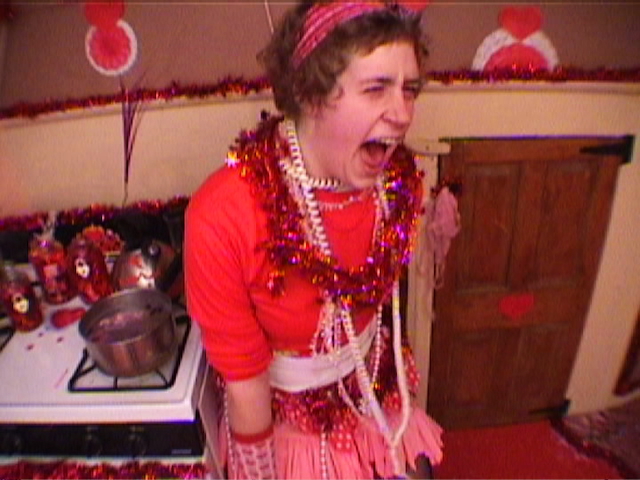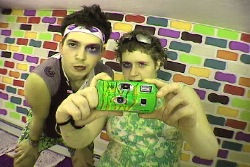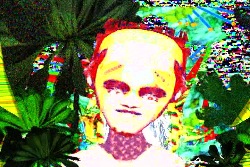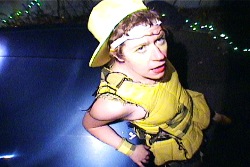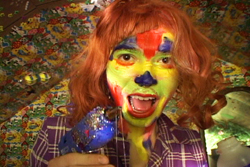
RYAN TRECARTIN
RYAN TRECARTIN
535 West 22nd Street, 5th Floor, New York City
RYAN TRECARTIN
535 West 22nd Street, 5th Floor, New York City
RYAN TRECARTIN
535 West 22nd Street, 5th Floor, New York City
Works
Trecartin describes this work as a "narrative video short that takes place inside and outside of an e-mail." Trecartin, wearing his signature make-up, jumps back and forth between male and female roles. Totally self-absorbed and equipped with vestigial attention spans, the stylized characters are constantly on the phone or online. Their e-mail exchanges and Internet searches are channeled into bright animations that intersect with "real world" locations; the story moves from person to person like a browser surfing through Web pages.
Trecartin hurtles the viewer into a narrative universe dominated by the fleeting logic of text messaging, MySpace, pop music, and disposable culture. He takes the clichéd gay coming-out story and processes it and reprocesses it until it is almost unrecognizable. Trecartin stars as Skippy, a colorful and troubled teenager with a secret. After a failed suicide attempt, his parents catch him with a boy in his room, he is hit by a car, his friends throw a party, and he rises from the dead in time for fireworks.
In Kitchen Girl, Trecartin's frequent collaborator Lizzie Fitch throws herself into a state of total hysteria, portraying a girl who takes the childhood game of "playing house" to a dark and disturbing place. Her overwrought performance is perfectly matched by Trecartin's skillful, hyperkinetic editing. Together they turn Trecartin's kitchen into a dimly lit world of mental trauma. Combining the innocuous with the malevolent, Fitch and Trecartin escort the viewer on a whirlwind tour of household dysfunction, child abuse, and isolation.
Trecartin crafts a fantastical narrative about a girl whose obsessive personal utopia is disrupted. Trecartin's collaborator, Lizzie Fitch, plays a girl obsessed. Everything in her hyperactive, sped-up world revolves around Valentine's Day: red, white, and pink love-themed decorations cover every surface; heart shapes abound; Valentine's Day treats are everywhere. Her private festivities suddenly go awry as a hoard of Christmas-themed intruders appear; gagged and bound, "Valentines Day Girl" is forced to watch while her captors stage a frenzied Christmas intervention.
Trecartin and his collaborator/co-star Lizzie Fitch ponder the messages delivered by the most banal forms of mass media and pop culture in their own unique version of a music video. They voice questions in song and dance segments that feature a deliberately ill-fitting pastiche of discarded fashions of the past two decades and recycled pop-music clichés. Totally immersed in their meticulously crafted private universe, Trecartin and Fitch coyly point at the gaudy artifice surrounding us in our own.
Trecartin's extraordinary digital manipulations reach a new level as he speculates in vivid animation about reproduction, sexuality, and contemporary moralities. Evoking lo-fi, promotional, cult-worship videos, Trecartin and his fantastically costumed collaborators manufacture an alien yet familiar reality, hyper-saturated with media. Inside this startling new video world, technophile gods argue about the future of gender and produce cryptic TV commercials, while characters deliver disjointed polemics that could have originated in ad campaigns, instant messaging conversations, or twisted episodes of syndicated science fiction.
In Yo A Romantic Comedy, Trecartin borrows clichés from hip-hop culture and genre films to craft a dark, dream-like narrative that veers from comic melodrama to goth fantasy. Applying his signature digital editing and delirious sound processing to remarkable effect, Trecartin creates an alternative narrative universe that suggests a kind of psychodramatic hyper-reality.



